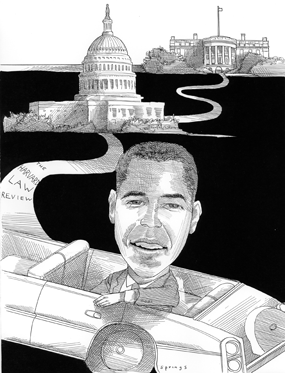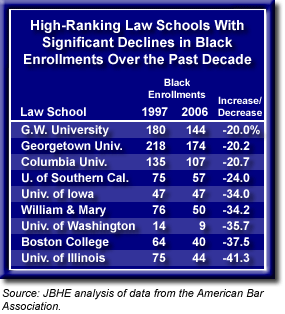The Prospect of a Black President of the United States
At this early stage of the campaign, Senator Barack Obama of Illinois, an African American who was the first black to head the Harvard Law Review, has emerged as the main challenger to Hillary Rodham Clinton for the Democratic nomination for president of the United States. What do the polls tell us about Obama’s prospects?
A recent Newsweek poll said that 93 percent of all Americans would be willing to vote for a qualified black candidate for president. A clear majority said they believed that the nation was ready to elect an African American to its highest office.
But in nationwide polls of registered Democrats, Clinton is still the top choice. Obama is second. In New Hampshire, site of the first primary election, Obama is running neck and neck with Clinton. In Iowa, where the first caucuses will be held next January, Obama and former North Carolina Senator John Edwards are in the lead, with Clinton in fourth place.
But the question on many Democrats’ minds is whether either Obama or Clinton is electable. Indeed, polls of head-to-head matchups show Edwards running better than Clinton or Obama when paired against John McCain or Rudy Giuliani, the GOP frontrunners.

A big question facing Obama is whether people are telling the pollsters the truth. In 1982 Los Angeles mayor Tom Bradley, a black man, narrowly lost the race for governor of California despite a comfortable lead in pre-election polls. This so-called Bradley Effect, where black candidates do worse than their poll numbers suggest, has been demonstrated time and time again over the past quarter century.
It appears that many people who tell pollsters they favor a black candidate suddenly revert to their racial prejudices once they are in the sanctity of the polling booth.
  |
“We say in church that our children are all equal in the eyes of God. And they are equal in the eyes of God but not in the eyes of America.”
— Jonathan Kozol, author of the book The Shame of the Nation: The Restoration of Apartheid Schooling in America, speaking at Philander Smith College, a historically black educational institution in Little Rock, Arkansas, 1-16-07
|
University of Kentucky Establishes New Financial Aid Programs for Low-Income Students
 Last month we reported that the University of Louisville, a state-operated university in Kentucky, established the Cardinal Covenant program for low-income students. Now the state’s flagship institution, the University of Kentucky in Lexington, has launched its Catalyst Scholars program for low-income students. Under the program, students who are eligible for federal Pell Grant awards will qualify for state scholarship grants of $2,020. Last month we reported that the University of Louisville, a state-operated university in Kentucky, established the Cardinal Covenant program for low-income students. Now the state’s flagship institution, the University of Kentucky in Lexington, has launched its Catalyst Scholars program for low-income students. Under the program, students who are eligible for federal Pell Grant awards will qualify for state scholarship grants of $2,020.
In addition, under the new Trustees Scholars program, high-achieving students from the state’s community college system will be able to transfer to the University of Kentucky and pay the same low tuition that they paid at their community college.
State officials estimate that the new financial aid initiatives will cost $2.7 million in the next academic year but will increase to $5.5 million by 2011.
NCAA Votes Down Proposal to Ban Postseason Athletic Contests in States That Continue Official Displays of the Confederate Flag
 The National Collegiate Athletic Association voted down a proposal to prohibit postseason championship games from being played in the states of South Carolina and Mississippi. Proponents of the measure sought to ban postseason games in these states on the ground that the states continue to maintain official displays of the Confederate flag. The National Collegiate Athletic Association voted down a proposal to prohibit postseason championship games from being played in the states of South Carolina and Mississippi. Proponents of the measure sought to ban postseason games in these states on the ground that the states continue to maintain official displays of the Confederate flag.
The NCAA does not schedule postseason regional or national championships in South Carolina or Mississippi. But it refused to go further by banning individual postseason contests on campuses in these states. The NCAA’s Minority Opportunities and Interests Committee concluded that colleges and universities had no control over the practices of their state governments and therefore should not be penalized.

Ursuline College

Assistant Dean,
Professional Education and Assessment
Ursuline College, founded in 1871, is one of the oldest Catholic women’s liberal arts colleges in the United States, offering 35 undergraduate and 8 graduate programs to more than 1600 students.
The College announces a search for an Assistant Dean for Professional Education and Assessment responsible for administration of the Education Unit, including daily operations, budgeting, compliance with NCATE standards, and program admission and retention. Additional responsibilities include leadership of College-wide assessment of student learning. Log on to http://www.ursuline.edu/jobs/jobs.php for more information.
A letter of interest, curriculum vita and three letters of reference should be sent to:
JoAnne M. Podis, Ph.D.
Vice President of Academic Affairs
Ursuline College
2550 Lander Road
Pepper Pike, OH 44124
E-mail address: mailto:jpodis@ursuline.edu.
Deadline for application is March 9, 2007. EOE.

Racial Shortfall in Degree Attainments in Science and Engineering
 A new report from the Commission on Professionals in Science and Technology finds that African Americans continue to struggle to gain a foothold in science and engineering fields. The report finds that African Americans, who are 13 percent of the U.S. population, earn only 8 percent of the bachelor’s degrees in science and engineering fields. At the graduate level, the racial disparity is even greater. Blacks make up 6.3 percent of all students earning master’s degrees and 2.8 percent of all doctorates in the sciences and engineering. A new report from the Commission on Professionals in Science and Technology finds that African Americans continue to struggle to gain a foothold in science and engineering fields. The report finds that African Americans, who are 13 percent of the U.S. population, earn only 8 percent of the bachelor’s degrees in science and engineering fields. At the graduate level, the racial disparity is even greater. Blacks make up 6.3 percent of all students earning master’s degrees and 2.8 percent of all doctorates in the sciences and engineering.
The small number of blacks earning degrees in these fields is reflected in occupational statistics. The report finds that blacks make up less than 6 percent of all people employed as mechanical engineers, aerospace engineers, chemical engineers, industrial engineers, computer programmers, biologists, and psychologists.
Black College Administrators Shut Down Student Newspaper
 Administrators at Grambling State University, the historically black educational institution in Louisiana, halted publication of the student newspaper, The Gramblinite. The official reason for the shut-down was that the newspaper editors were guilty of plagiarism and had used poor grammar. Administrators at Grambling State University, the historically black educational institution in Louisiana, halted publication of the student newspaper, The Gramblinite. The official reason for the shut-down was that the newspaper editors were guilty of plagiarism and had used poor grammar.
The paper was permitted to publish once again after student editors threatened a lawsuit claiming violation of their first amendment rights. Some students at Grambling believe the paper was shut down because it had frequently published stories criticizing management and charging corruption in the university’s administration.
Web Site Where Columbia Students Vent Their Racist Anger
For the past year students at Columbia University could log on to the “Bored at Butler” Web site and anonymously post their views on any subject. The site, established by a Columbia University student, is not affiliated with Columbia University. But to gain full access to the site and to post messages you must log on through the Columbia University network or use a Columbia University e-mail address.
Until recently, the Columbia University logo appeared on the site. Now a disclaimer tells visitors that Bored at Butler is not affiliated with the university. However, you still cannot access the site unless you are affiliated with the university.
The problem has been that the postings include a wide range of racist and sexist material. As an example, one post refers to Columbia’s basketball coach as “a fuckin’ KFC-eatin’, 40-ounce havin’ porch monkey.”
While access is limited, JBHE readers can get a taste of what the site is all about by clicking here.
There are also links to similar sites at several other Ivy League institutions. The “Bored at Lamont” site for Harvard students is the most popular.
Police Department to Offer Full College Scholarships to Black Students in Return for Three-Year Commitment to the Force Upon Graduation
 Students in the criminal justice program at Winston-Salem State University, the historically black educational institution in North Carolina, can receive a full scholarship and a book allowance if they agree to join the Winston-Salem police department upon graduation and commit to serving on the force for at least three years. The police department hopes to provide full scholarships for up to four students at Winston-Salem State University each year. Students in the criminal justice program at Winston-Salem State University, the historically black educational institution in North Carolina, can receive a full scholarship and a book allowance if they agree to join the Winston-Salem police department upon graduation and commit to serving on the force for at least three years. The police department hopes to provide full scholarships for up to four students at Winston-Salem State University each year.
While details are still being worked out, students seeking the scholarships would have to achieve a grade point average of 3.0 during their first two years in college and to pass a criminal background and physical fitness test.
Significant Increase in Black Applicants to UCLA
 This past fall there were only 99 black freshmen who enrolled at the University of California at Los Angeles. They made up just 2 percent of the first-year class. This past fall there were only 99 black freshmen who enrolled at the University of California at Los Angeles. They made up just 2 percent of the first-year class.
In an effort to increase diversity in the student body, the UCLA administration has adopted a new admissions model that will follow a so-called “holistic” approach which looks at academic merit in the context of a student’s position in society. Under the new plan, a student of any race who comes from a low-income family and attends high school in an inner-city school district that has a poor record in sending kids on to college might be seen in a more favorable light by admissions officials than a student with slightly higher academic credentials who grew up in an upper-middle-class family and attended high school in a wealthy suburban district.
Officials at UCLA hope to use the new admissions model for the class entering the university in the fall of 2007. The new plan is patterned after the “comprehensive review” admissions model used at the University of California at Berkeley.
The announcement of the new admissions plan appears to have produced positive results. UCLA announced that it received 2,444 applications from black students this year. This was up 12.5 percent from a year ago. Blacks are 5 percent of the applicant pool at UCLA this year.
Appointments
 • Harold Ford Jr., a former congressman who this past November narrowly lost a bid to become the first black U.S. senator from the South since Reconstruction, is currently a visiting professor at Vanderbilt University. Ford is teaching a seminar entitled “Foundations of American Political Leadership.” • Harold Ford Jr., a former congressman who this past November narrowly lost a bid to become the first black U.S. senator from the South since Reconstruction, is currently a visiting professor at Vanderbilt University. Ford is teaching a seminar entitled “Foundations of American Political Leadership.”
 • Lioba Moshi, professor of comparative literature and director of the African Studies Institute at the University of Georgia, was named University Professor. • Lioba Moshi, professor of comparative literature and director of the African Studies Institute at the University of Georgia, was named University Professor.
Professor Moshi is a native of Tanzania and holds bachelor’s and master’s degrees from the University of Dar Es Salaam. She also holds a master’s degree from the University of York in England and a Ph.D. in linguistics from UCLA.
• Edward Bouie Jr. was named president of the Atlanta campus of Argosy University. Bouie, a former executive director of the DeKalb County School System, has been an administrator at Argosy since November 2004, most recently as vice president for academic affairs.
Bouie is a graduate of Morris Brown College. He holds a master’s degree from Georgia State University and an educational doctorate from Clark Atlanta University.
 • Rod Broadway was appointed head football coach at Grambling State University in Louisiana. He was the head coach at North Carolina Central University in Durham. • Rod Broadway was appointed head football coach at Grambling State University in Louisiana. He was the head coach at North Carolina Central University in Durham.

Florida Gulf Coast University

Registrar
FGCU is a young, rapidly growing, comprehensive state university w/over 8000 students enrolled in over 60 undergraduate & graduate programs. We seek a vibrant & enthusiastic senior professional w/the vision, knowledge, experience, & leadership skills to grow w/the institution as its Registrar.
Req’d: MA/MS in an appropriate area of specialization & 5yrs of progressively responsible exp. in admissions, registration, records mgmt., transfer articulation or rel. area; or BS/BA & 7yrs progressively responsible exp in admissions, registration, records mgmt, transfer articulation or rel. area.
Prefer: MA/MS with over 5yrs of demonstrated exp. working in a higher education institution. Experience with SCT/Banner Student module, CollegeNet's Series 25 and/or Cognos software. Knowledge of NCAA Division I initial and continuing eligibility regulations. Knowledge of CAI, and the NCAA Compliance Assistant Software. Strong supervisory and leadership skills.
Position Description: The registrar is responsible for the daily operations related, but not limited, to: the professional, support and student staff, course enrollment and classroom management, student academic records, NCAA Division I academic and transfer eligibility, federal, state and university academic policies and regulations, commencement events, academic calendar, Veterans services, and the university's degree auditing system and support services. The Registrar recommends issues of policy to the Provost.
To Apply: Visit http:/jobs.fgcu.edu and access REQ# 0557. Deadline: 2/23/07.
EO/EA/AA/Employer, which has commitment to cultural, racial, & ethic communities and encourages women and minorities to apply. It is expected that successful candidates share in this commitment.

|
Both Congress and the President Propose an Increase in Pell Grants
The maximum Pell Grant award has remained at $4,050 for the past five years. For the most part, these awards are for college students who come from families with incomes below $40,000 per year. As expected, blacks make up a disproportionate percentage of Pell Grant recipients. Without the Pell Grant program many blacks from low-income families would be unable to attend college.
The new Democratic-controlled Congress has proposed a $260 increase in the maximum Pell Grant for next year. But President Bush upped the ante calling for a rise of $550 next year and $1,350 over the next five years.
The problem is that the administration’s plan calls for cuts to other student aid initiatives in order to pay for the increase in Pell Grants. The proposed $550 increase in the maximum awards would cost taxpayers $2 billion next year.
The Pell Grant issue will be a political hot potato over the coming weeks as both sides look to enhance their credentials as the party that is most concerned about education.
New Medical School to Open in Harlem
 The Touro College of Osteopathic Medicine will open on 125th Street in Harlem across from the Apollo Theater. The school will recruit its students from underrepresented minorities. The clinical training will take place at hospitals in Harlem and other areas of the city with large minority populations. The Touro College of Osteopathic Medicine will open on 125th Street in Harlem across from the Apollo Theater. The school will recruit its students from underrepresented minorities. The clinical training will take place at hospitals in Harlem and other areas of the city with large minority populations.
The new medical school will have 75,000 square feet of classrooms, lecture halls, offices, and laboratories.
The school plans to open this fall. Tuition at the medical school for the first entering class will be $31,125.

University Of North Carolina At Wilmington

Director of Human Resources Administration
Reporting to the Assistant to the Chancellor/Director of Human Resources, the Director of Human Resources Administration is responsible for developing, implementing, and managing human resources policies and procedures within the overall areas of salary administration, benefits administration, employee records, and human resources automated systems. This includes time keeping and leave administration, retirement and deferred annuity programs, and the SCT Banner HR module (implemented in 2006). Coordinative plans are underway for a new state level automated system (SAP “BEACON”) with which the university will be required to interface; this position will be responsible for leading the HR components of that project. Joining the Directors of Employment & Compensation and Employment Relations & Staff Development, this position serves as the leader of one of three of functional areas within HR. In addition, this position serves as the lead or “deputy” Director during any absence of the Director of HR.
To view the full vacancy announcement and apply online, please visit http://consensus.uncw.edu. Priority consideration will be given to online applications received by February 28, 2007 but will be accepted until the position is filled.
UNCW is an EEO/AA employer. Women and minorities are especially encouraged to apply.

Top-Ranked Law Schools With Major Declines in Black Enrollments Over the Past Decade
In last week’s edition, JBHE reported the high-ranking law schools that have achieved the best progress in increasing black enrollments over the past decade. Now JBHE reports on the poor performers.
Eighteen of the nation’s 30 highest-ranked law schools have shown a decline in black enrollments since 1997. Nine of these law schools have posted declines of 20 percent or more. The largest decline was at the University of Illinois. In 1997 there were 75 black students at the law school at the University of Illinois. The latest enrollment figures show 44 black students, a decline of more than 41 percent. In 1997 blacks were 12.4 percent of all students at the law school. Today blacks make up 6.9 percent of the law school’s students.
The law schools at the University of Iowa, the College of William and Mary, the University of Washington, and Boston College have all shown declines of 33 percent or more.

New President of Black History Association
 John E. Fleming, vice president of the Cincinnati Museum Center and former director of the National Underground Railroad Freedom Center, has been elected to a three-year term as president of the Association for the Study of African-American Life and History. The organization, based in Washington, D.C., was founded in 1915 by Carter G. Woodson. It has 2,200 members nationwide. John E. Fleming, vice president of the Cincinnati Museum Center and former director of the National Underground Railroad Freedom Center, has been elected to a three-year term as president of the Association for the Study of African-American Life and History. The organization, based in Washington, D.C., was founded in 1915 by Carter G. Woodson. It has 2,200 members nationwide.
Dr. Fleming, like Woodson, is an alumnus of Berea College in Kentucky. Fleming holds a master’s degree and a Ph.D. in American history from Howard University.
Blacks Losing Ground in the Tennessee Education Lottery Scholarships
 Over the past three years the state lottery has provided more than $750 million to the Tennessee Student Assistance Corporation for college scholarships. In order to be eligible for the scholarships a student must have earned a grade point average of 3.0 in high school or have achieved a score of 21 on the American College Testing Program’s ACT standardized test for college admission. Nationwide the average score for blacks on the ACT test is 17 on a 1 to 36 scoring scale. Less than one in five black students scores 21 or above on the ACT. Over the past three years the state lottery has provided more than $750 million to the Tennessee Student Assistance Corporation for college scholarships. In order to be eligible for the scholarships a student must have earned a grade point average of 3.0 in high school or have achieved a score of 21 on the American College Testing Program’s ACT standardized test for college admission. Nationwide the average score for blacks on the ACT test is 17 on a 1 to 36 scoring scale. Less than one in five black students scores 21 or above on the ACT.
Students enrolling at a four-year college in Tennessee receive annual scholarships of $3,800. Students enrolling at two-year community colleges receive $1,900 scholarships. To retain their scholarship, students must achieve a grade point average in college of 2.75 during their freshman year. For upperclassmen, a grade point average of 3.0 must be achieved to renew their scholarships.
New data from the state lottery shows that blacks are losing ground. In 2004 blacks made up 19 percent of the students enrolled at public colleges and universities in Tennessee. Yet they made up only 10 percent of the students who qualified for lottery scholarships. In 2006 blacks were only 8 percent of the students who qualified for the scholarships.
The education lottery scholarships also disproportionately benefit students from more affluent families. Students from families with incomes below $36,000 a year make up 48 percent of all enrollments at Tennessee’s state-operated institutions of higher education. But only 24 percent of all education lottery recipients come families at that income level.
  |
10.6% Percentage of all white American males ages 16 to 24 who are enrolled in college who attend classes only part-time.
16.8% Percentage of all African American males ages 16 to 24 who are enrolled in college who attend classes only part-time.
source: U.S. Bureau of the Census
|
New Effort to Fund Modernization of Computer Infrastructure at the Nation’s Black Colleges and Universities
 Senators Jim Webb and John Warner of Virginia have reintroduced legislation to provide up to $250 million to upgrade the computer infrastructure at the nation’s historically black colleges and universities. Hispanic-serving institutions and tribal colleges would also receive grants under the legislation. The bill was passed by the Senate in both 2003 and 2005 but never reached the House floor. Senators Jim Webb and John Warner of Virginia have reintroduced legislation to provide up to $250 million to upgrade the computer infrastructure at the nation’s historically black colleges and universities. Hispanic-serving institutions and tribal colleges would also receive grants under the legislation. The bill was passed by the Senate in both 2003 and 2005 but never reached the House floor.
The Bush administration has voiced opposition to the measure.

Duke University

Dean, Nicholas School of the Environment and Earth Sciences
Duke University invites nominations and applications for the position of Dean of the Nicholas School of the Environment and Earth Sciences. The Nicholas School is one of the world's premier centers for environmental research with educational programs at the undergraduate, master's, and doctoral level. Located within one of the nation's foremost research universities, the School's 50-member faculty brings together natural and social scientists to teach and conduct basic and applied research in environmental, earth and marine sciences, and to engage effectively the pressing environmental policy issues of our time.
The Dean is the chief academic and administrative officer of the Nicholas School whose responsibilities include strategic planning; faculty appointments; budgetary and administrative oversight; and stewardship and development. As a member of the Cabinet of Deans, the Dean of the Nicholas School works collaboratively with the Provost, President, and other Deans in fostering the aims of the University as a whole. Additionally, the Dean is a representative of the School to the University, alumni, relevant external groups, and the public at large.
The Dean of the Nicholas School is expected to be an intellectual leader among the faculty. He or she should be an accomplished scholar or, in exceptional circumstances, a leading practitioner with substantial experience in the environmental field. The Dean will be expected to continue the school's strong tradition of interdisciplinary scholarship in the natural and social sciences and, in this dynamic era of globalization, extend the School's reach abroad. In alignment with the University's focus on knowledge in the service of society, the Dean, jointly with the Provost, will oversee the Nicholas Institute for Environmental Policy Solutions to ensure meaningful engagement by Duke's faculty in environmental policy development and in the effective training of the next generation of environmental leaders.
Please send nominations and applications electronically to mailto:deansearch@nicholas.duke.edu. Candidates should submit a cover letter highlighting relevant areas of experience, a curriculum vita, and three names of individuals familiar with the candidate's qualifications. Confidentiality will be maintained. The review of nominations and applications will begin on March 1, 2007 and continue until the position is filled. For further information about the Nicholas School Dean Search, including a complete position description, see http://www.nicholas.duke.edu/deansearch.
Duke University is an equal opportunity/affirmative action employer.

In Memoriam
Ruth Brett Quarles (1914-2007)
Ruth Brett Quarles, whose career as an administrator in higher education spanned more than four decades, died from complications after hip surgery last month at a hospital in Latham, Maryland. She was 92 years old.
A native of Murfreesboro, North Carolina, Quarles was valedictorian of her high school class. She went on to earn a bachelor’s degree from Shaw University in Raleigh, North Carolina. She held a master’s degree from the Hartford Seminary Foundation and an educational doctorate from Columbia University.
She began her academic career at Spelman College in Atlanta in 1936. Over the next two decades she held various administrative and faculty positions at Dillard University, Bennett College, Tuskegee University, and Fisk University. In 1956 she was named director of student personnel and counseling services at Morgan State University in Baltimore. She remained in that position for nearly a quarter-century.
Quarles was the widow of renowned African-American historian Benjamin Quarles, who died in 1996.
Joseph Moore (1932-2007)
Joseph Moore, former head of the department of technology at Norfolk State University, died late last month. He was 74 years old.
A native of Wakefield, Virginia, Moore was an alumnus of Norfolk State, where he was a member of the football team. He married a Norfolk State student and the couple moved to New York where his wife earned a bachelor’s degree in nursing. The pair returned to Virginia when Moore’s wife landed a teaching job at Norfolk State. Joseph Moore then studied for a master’s degree at Virginia State and a Ph.D. at Virginia Tech. He, too, secured a teaching position at Norfolk State University. He retired in 1996.
Retirement
 • W.H. “Joe” Knight, dean of the School of Law at the University of Washington, has announced that he will retire from the deanship at the end of the academic year. He currently plans to take a year off and then return to the law school as a tenured professor. • W.H. “Joe” Knight, dean of the School of Law at the University of Washington, has announced that he will retire from the deanship at the end of the academic year. He currently plans to take a year off and then return to the law school as a tenured professor.
Awards
 • Doris Wilkinson, professor of sociology at the University of Kentucky, was presented with the Coretta Scott King Award from the Alpha Kappa Alpha sorority. In 1954 Professor Wilkinson was one of the first black students to enroll at the university. In 1968 she became the first African-American woman to be hired to a full-time faculty post at the University of Kentucky. • Doris Wilkinson, professor of sociology at the University of Kentucky, was presented with the Coretta Scott King Award from the Alpha Kappa Alpha sorority. In 1954 Professor Wilkinson was one of the first black students to enroll at the university. In 1968 she became the first African-American woman to be hired to a full-time faculty post at the University of Kentucky.
• Dennis Jackson, director of personnel for the school system in Paducah County, Kentucky, was inducted into the Athletics Hall of Fame at Murray State University. In 1960 Jackson was the first African-American student athlete at the university.
 • Charlayne Hunter-Gault, Johannesburg bureau chief for CNN and one of the first two black students at the University of Georgia, received the Distinguished Achievement in Broadcasting Award from the DiGamma Kappa society at the Grady College of Journalism and Mass Communication at the University of Georgia. • Charlayne Hunter-Gault, Johannesburg bureau chief for CNN and one of the first two black students at the University of Georgia, received the Distinguished Achievement in Broadcasting Award from the DiGamma Kappa society at the Grady College of Journalism and Mass Communication at the University of Georgia.
Grants
 • The National Society of Black Engineers received a five-year, $1 million grant from Battelle, a nonprofit research and development organization headquartered in Columbus, Ohio. Half of the grant will be used to provide scholarships for black engineering students at colleges and universities across the United States. The other funds will be used for programs at grade schools and middle schools to encourage black students to pursue careers in engineering. • The National Society of Black Engineers received a five-year, $1 million grant from Battelle, a nonprofit research and development organization headquartered in Columbus, Ohio. Half of the grant will be used to provide scholarships for black engineering students at colleges and universities across the United States. The other funds will be used for programs at grade schools and middle schools to encourage black students to pursue careers in engineering.
• The University of Mississippi’s William Winter Institute for Racial Reconciliation received a $146,000 grant to complete the restoration of the Rosenwald School in Drew, Mississippi. More than 600 Rosenwald schools were built in Mississippi in the early twentieth century to educate African-American children. Only 11 of the school buildings remain in existence.
The renovated structure will be used as a community center.
|
 .
.